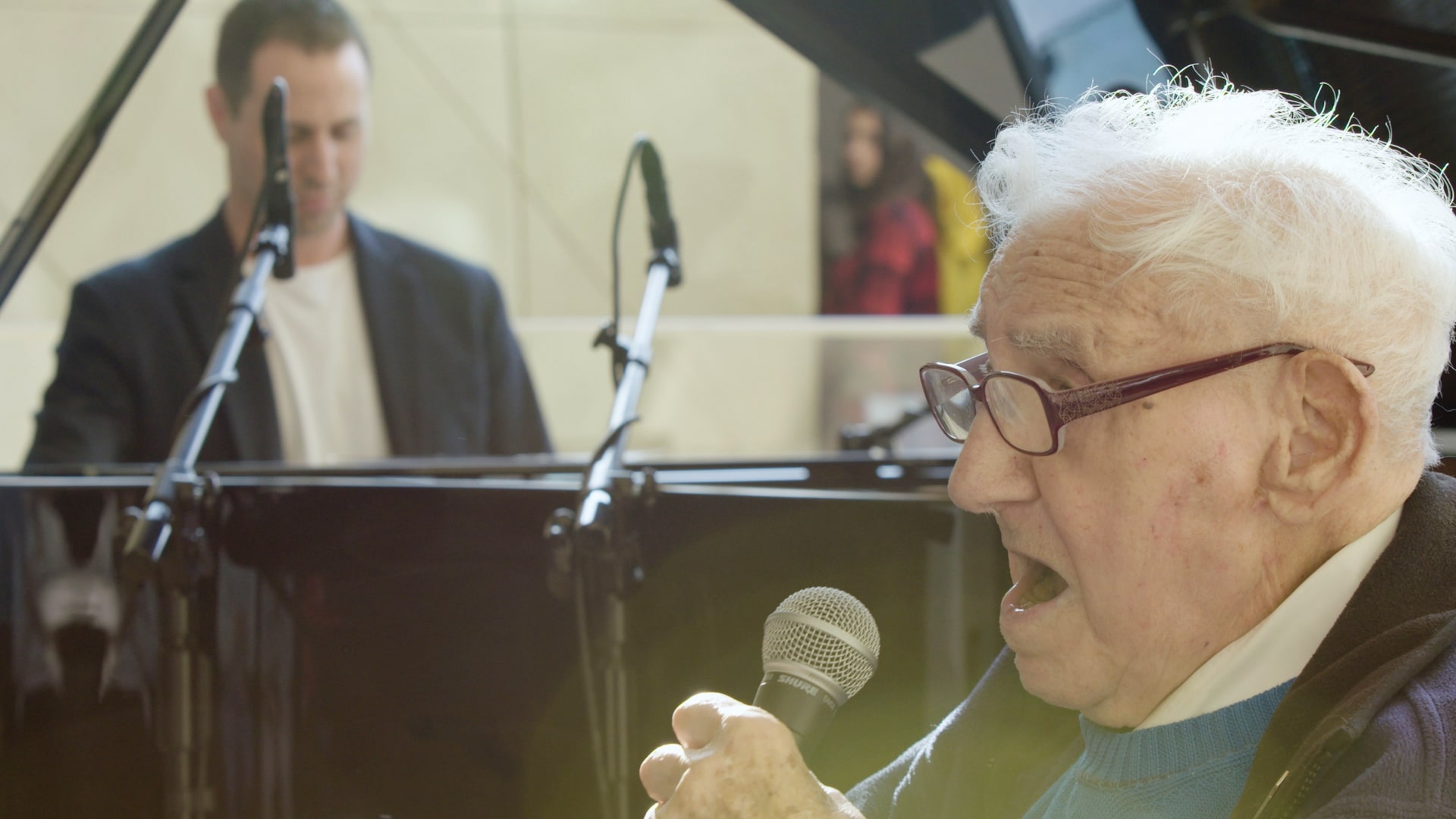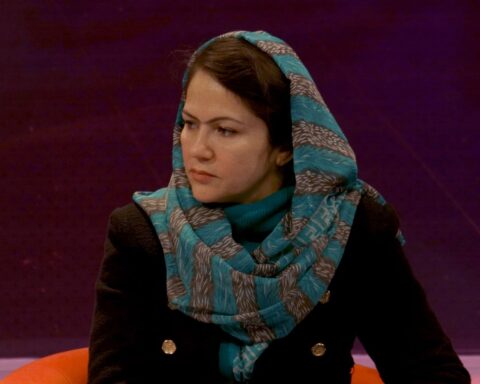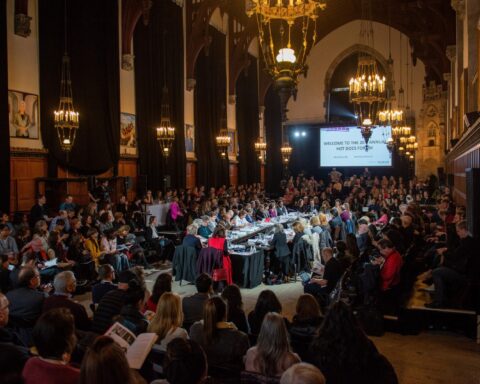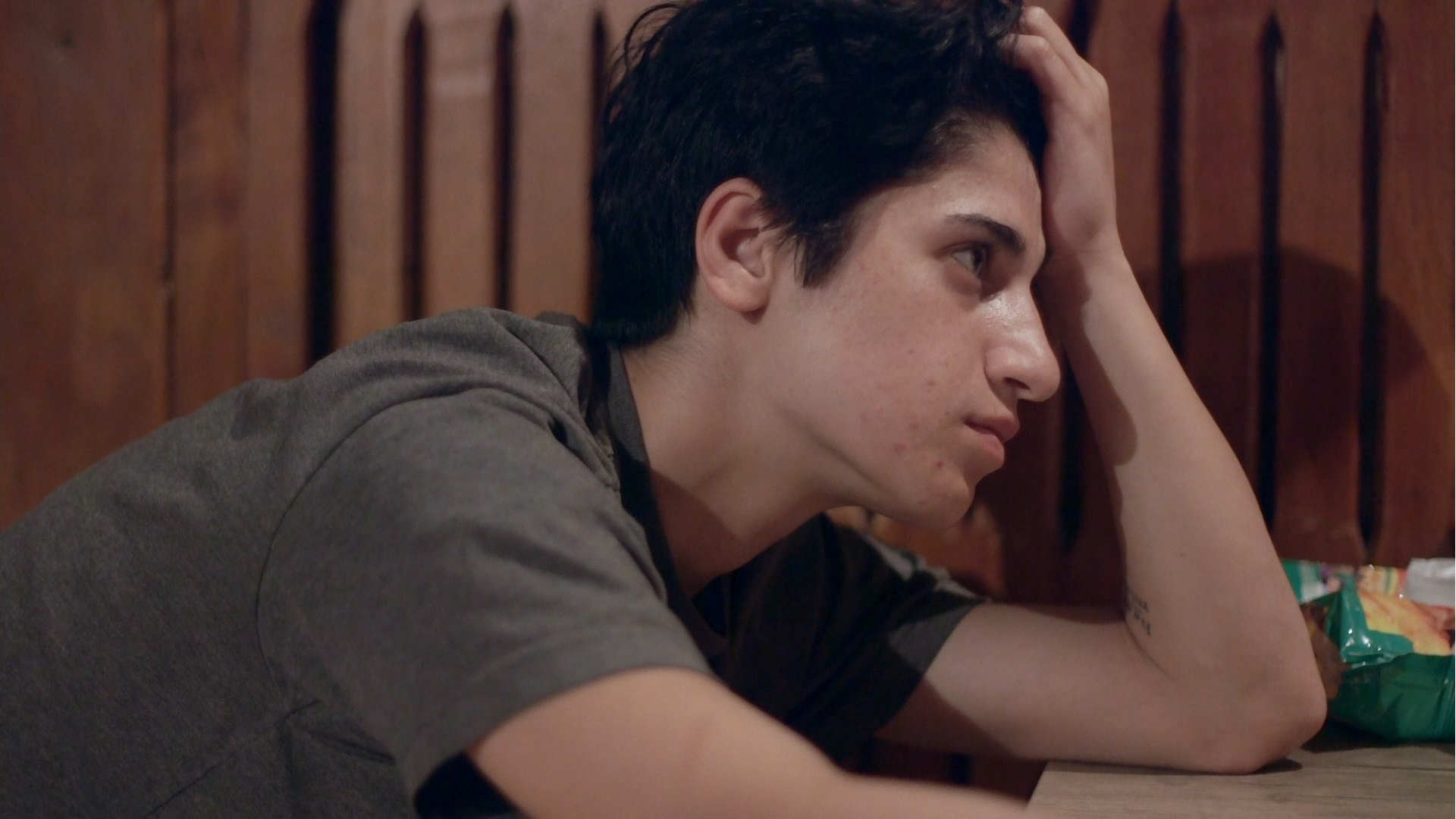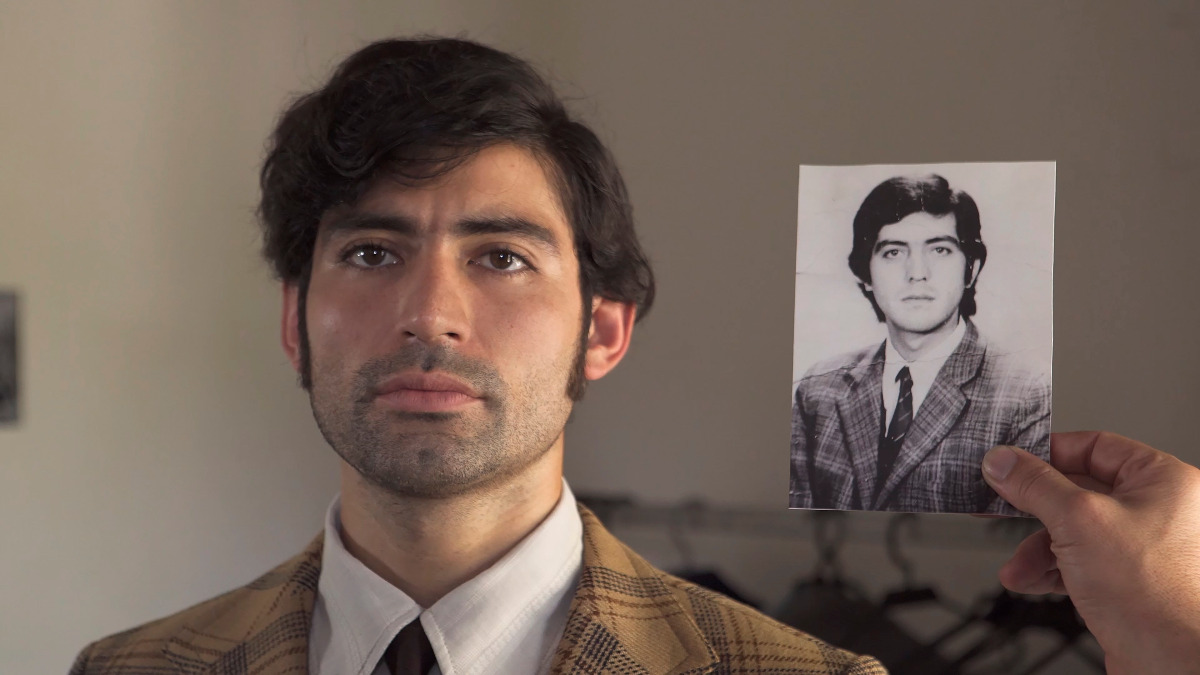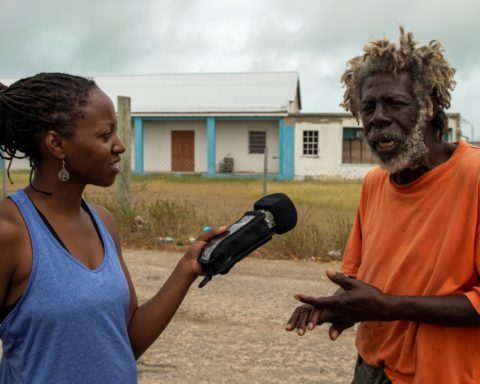For over a decade, Sara Taksler helped make Jon Stewart’s The Daily Show one of the most important and erudite shows on television, using comedy to uncover sometimes painful truths about people and politics. Her 2016 feature Tickling Giants followed Bassem Youssef, the former doctor who took cues from Stewart’s show to poke fun at the ruling class of his native Egypt.
On first blush, Taksler’s latest film, How Saba Kept Singing, appears to be one among a myriad of well-meaning yet didactic, dull, or even maudlin looks at a Holocaust survivor. However, thanks to the filmmaker’s keen eye for story and well-honed ability to tell complex tales in accessible yet nuanced ways, we’re treated to quite a special tale of a remarkable individual.
David Wisnia spent his teens in Auschwitz, given special treatment in part because of his fine singing voice. If that was the only part of his life being documented it may have been enough, but Taskler’s tale encompasses far more, diving into the connection the boy had with Helen “Zippi” Spitzer, a young artist who played a remarkable role in keeping David and many others from the maws of the murder camp.
Navigating myriad narrative threads via first-person interviews, recorded testimonials and animated sequences, the film is an accessible, moving portrait of people finding glimmers of regular life within a bleak house of death. A powerful, unforgettable story, How Saba Kept Singing is partially a romance, partially a horror/thriller, and mainly a testament to the power of musical expression, humour and resilience in the face of unfathomable evil,
POV spoke to the film’s director prior to its World Premiere at Hot Docs.
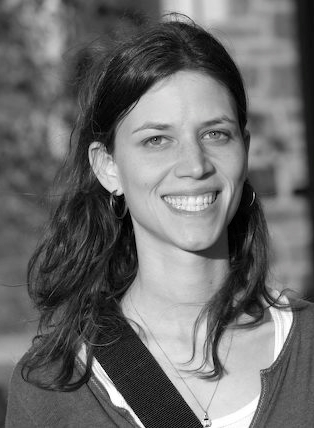
POV: Jason Gorber
ST: Sara Taskler
POV: Let’s talk about how stories like this come into your life. Do you have a specific connection with the subject? Was it something that you heard floating in the ether? This story seems almost too perfect to be true.
ST: I played the long game on this one. I actually met this family in nursery school, when I was 3! I obviously did not pitch the documentary idea at the time, but I was friends growing up with one of David’s grandsons. Dov, and David’s son Eric was actually my Rabbi growing up. So I’ve always known them, always knew that David survived the Holocaust and that he sang, but I didn’t know the details of his story until a few years ago when I heard him speak. I went up to his grandson Avi afterwards and said, “Have you guys ever thought about doing a movie?” We call David the Jewish Forrest Gump. He’s had a crazy life.
POV: Even though the Jewish Forrest Gump is more like Zelig. Can you talk about navigating grey moral areas and making sure that you’re doing justice to the ambiguity of two people within the midst of this carnage?
ST: How Saba Kept Singing is loosely about Saba who felt that he survived the camps strictly because he had a beautiful singing voice. As he starts to tell his grandson his life story, he realizes there are some unanswered questions and a few things aren’t adding up and they go off on this mystery to figure out how, who or what actually helped him to survive. Avi, the grandson, said something I love that actually didn’t make it into the film: “When you go to Auschwitz, it’s just another place. You get there and the sky is blue, and the grass is green, and the wind is blowing. The people who are in there are not like some black and white movie—they’re real people.”
What intrigues me is that I like stuff where people find humor or music or some sort of entertainment as their way of dealing with the world, which can be really dark, and in the case of the Holocaust, horrific. In telling the story, there was a balance. I’m not trying to deny or underplay the horrors of the Nazis and the Holocaust, but these are just people who are prisoners in these camps. For some of them, music is how they got up; for some of them, art was how they connected; for some people, it was about finding another person just to preserve their humanity. That, for me, is why I was drawn to the story.
POV: There’s a moment when he goes under the museum’s safety wire into the actual house, the cabin where he was imprisoned. I had a visceral reaction, not that he’s entering a place where he was captive, but, that you’re not allowed to go past the lines, this is a museum! You’re breaking the rules.
ST: Two things come to mind as I’m listening to you. One is my dad, who sometimes says he doesn’t know if he would have survived the Nazis because he wouldn’t have seen the warning signs. He would have followed the rules. My dad’s always said to us, “There’s always times when it’s OK to break rules.” With David, when we went to Auschwitz, there’s a story of when in the parking lot, going in, like you said, it’s a museum. He said to the parking attendant, “Do we have to pay? I was actually a resident here for several years,” joking around with the guy. And the guy let him in!
POV: You need to work hard to get the Auschwitz residence discount.
ST: It’s pretty weird to be there, we were filming and it was lunchtime, and we went in the cafeteria and we ordered lunch. It’s packed and it’s surreal…
POV: …The old Jewish joke, “The food’s terrible and the portions were too small.”
ST: [Laughs] When you’re approaching Auschwitz, you pass a KFC. It’s weird. It’s as it should be that it’s being preserved and that people are visiting, but it’s hard to wrap your head around that it is a place of death. There’s one point where we’re filming some b-roll, just footage to have, and we were in one of the gas chambers. I became physically nauseous because you’re just thinking about what happened in this space.
In editing the story together I always try to err on the side of humor, When David comes out of the bunk that you mention he says “Yeah, that hellhole.” He makes a joke, which I think it makes it easier to be receptive to it. There are movies that I really want to see and I think are important, but I just can’t bring myself to watch them. So in my own movies I try to tell the audience right away that you’re going to laugh and you’re going to enjoy yourself. There may be hard things in this, but we’re going to find a way through it. Hopefully, we’re appealing to people who aren’t just Holocaust film aficionados. There are people who haven’t seen films about the Holocaust who want to watch it, so we had to make sure it was clear [that they saw] the profound and horrendous impact of those places and on so many lives lost.
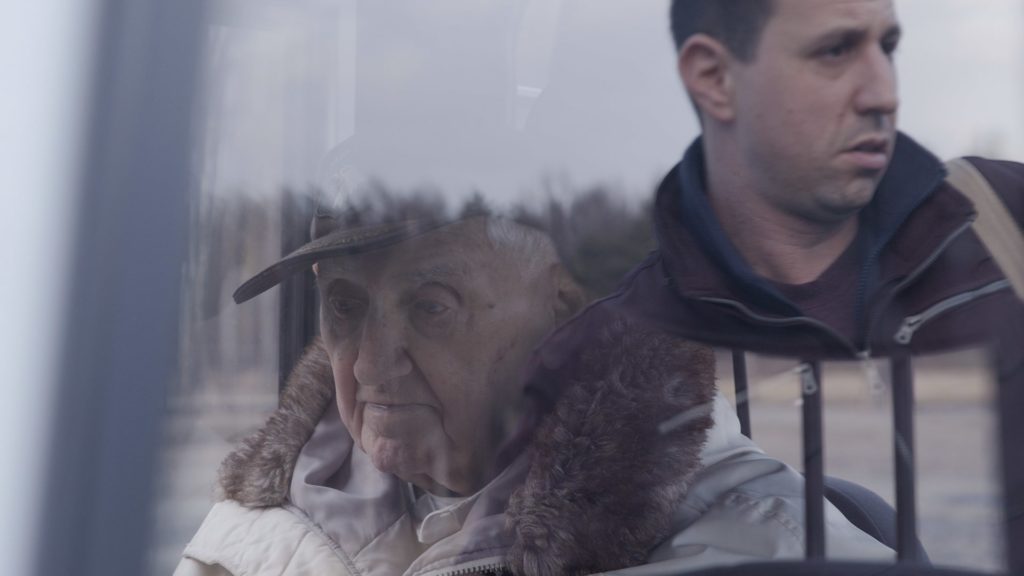
POV: I think that Zippy’s story is fascinating because she survived by collaborating. She became a favourite of the Nazis. David became the favourite of SS soldiers, who kept him alive. Those that did not collaborate, or at least coordinate with their captors, did not survive. That is a very hard thing to navigate, that one is willing to put oneself in a compromising position rather than simply fighting the oppression, and I think your film touches on that.
ST: I think Zippy would take issue with the suggestion of “collaboration.” I think that there’s a difference between helping you to achieve your goal as a Nazi leader and knowing you have no choice—you will be murdered, you don’t have an option. In David’s case, he had a talent that they enjoyed, and so he was allowed to survive as long as he provided it for them. But at no point was he under the illusion that he was free. There’s a moment in the film where his life is very much at risk because he oversteps his bounds, and there’s no question of who holds the power in that situation. But I think what you’re pointing out is that Zippy and David had a talent that was useful. Being useful kept them alive.
POV: What I find moving about your film is how it shows that that the Nazis’ insidiousness went in multiple levels. Artistic beauty could be exploited by those jailors who enslaved them. That’s why Zippy’s story is almost more fascinating than David’s. The villains in her life made her culpable in making choices of life and death.
ST: Zippy has a line, “Our main priority was to help our people, but we had to act like we were doing what was asked of us.” So if you make it obvious that you’re not following the rules, you’re never going to help anyone, including yourself. You’re going to be killed immediately in that situation. You’ve heard of survivor’s guilt? Why does one person get to live and another doesn’t? That’s an unanswerable question. There are millions of people who were valuable, as anyone is, who were murdered. They didn’t get the luck that David or Zippy had.
David wrote a song in the camps for his coworkers at his work assignment. That gave some of them hope. There’s actually a story, not in the film, about a fellow prisoner, who smuggled out the lyrics and song, kept them, and then decades later saw David and returned them to him. In his own way, David was trying to provide some help, some inspiration. For Zippy too, some of her ways of helping are much more literal, where she smuggled clean underwear to people and did other things that are really solid. You can list them and some are much more significant than others. But she could only do them as long as she wasn’t murdered. There’s other stories where she’s a minute from being killed and then by a stroke of luck or imagination she’s able to get out of it. It’s a hard thing to tell because you don’t want to glamourize this.
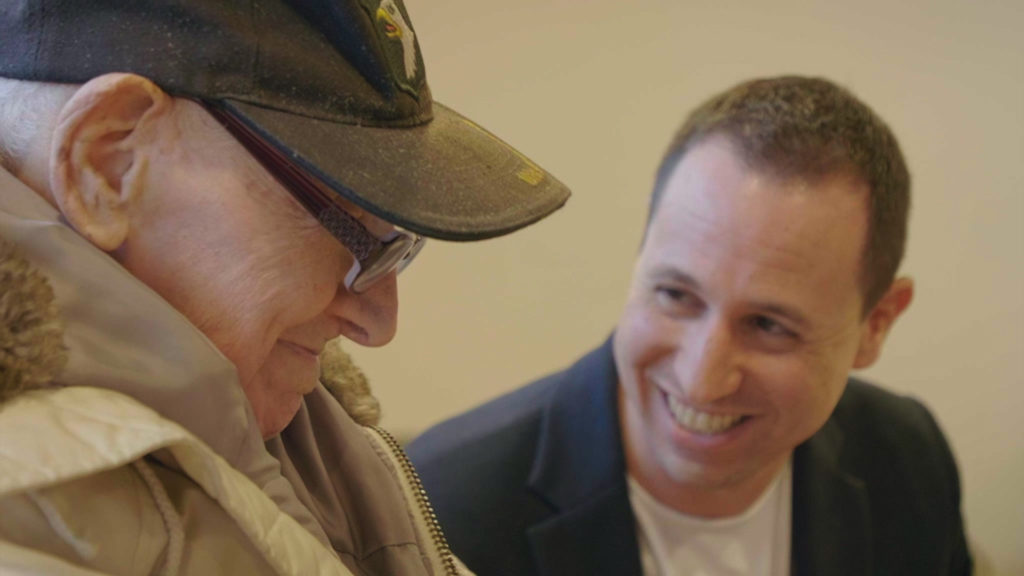
POV: How did you navigate the challenges of portraying characters and situations that are inherently grim and problematic?
ST: You watch the footage a million times until you don’t know what makes sense–what’s funny and what’s not–so I periodically like to do rough cut screenings. Obviously, at the beginning, that’s just about having your story make sense, so people can follow it. But then as it goes along, you start to hear what somebody likes, what someone doesn’t like. In my mind, once your movie’s getting good, all of the information is kind of conflicting and then it’s your job to decide which story to tell. So your favourite scene didn’t resonate for somebody else, and what they loved you’re like yeah, that was OK. But the stuff that I find interesting, that’s my job as a director. There’s a million ways to cut the same footage. I’m trying to tell the story that resonates the most for me.
David was very young. He was a teenager trying to survive and trying to find family and to live. Yeah, he didn’t go back [home after the war]. He made a promise that he didn’t keep. And there were people in some of the screenings who were a little turned off. For me, that told me I need to tell more about what David’s motivation was. You can react to whatever you want to react to, but what I didn’t want was for it to be unfair.
The truth is we hadn’t told enough in those early cuts of David’s reasoning. He had other family, he wanted to see if they were alive, and he hated Europe, Europe was a horrible place for him and he wanted to get out of there. Once I put the information out there, then I don’t care, you can react how you react. The truth was, once people had more information, it was sort of like, it’s bittersweet. They got it. No one then had a negative feeling of David in the sense of ‘he didn’t care,’ and recognized it was a terrible situation for him to be in. I wouldn’t want to be in that situation!
Whether you like him or don’t like him, all of that stuff is to tell the truth and then tell the parts of the story that interest me.
POV: How did your years in broadcast television of doing very short, succinct pieces on incredibly important political, comedic, social, stories shift into this feature-length vision?
ST: I worked in late night TV for the better part of two decades. 12 of those years were at The Daily Show and that’s a perfect example of telling hard, important stories and making them fun and entertaining. Typically those pieces are three minutes, five minutes. It’s really different with a feature where you almost feel flooded with options. You start to realize as you talk to people watching your film that everyone is really confident in their version of what’s right.
The best advice I got on my first feature was that you’re going to get a lot of feedback and all of that feedback is right. Your job is to decide which to listen to, since it’s all conflicting. One of the things I learned in more short form storytelling, more comedic stuff, is your first responsibility is to be entertaining. No one wants to watch something if they’re not entertained. You need a beginning, middle and end, and you need to craft a true story. Even though what you’re telling is real, you still have to approach it like a storyteller.
The other thing I learned is that things have to work on paper if they’re going to work on the screen. Some stuff can work on paper and not work on the screen, but if it doesn’t work on paper, it’s never going to work as a story. Figuring out your script the same way you would as if it were a narrative is really important. I love paper cuts because you first see how to make the story make sense. It can totally be a dud when you’re watching the film, as the most important thing is the energy and the feeling of the actual film. I learned those things with The Daily Show, about how you work on the script and how you tell the story and how you need to find supporting evidence.
We approached stuff on the show kind of like the way you would your five-paragraph essay in school. You have a thesis and you have an emotional point of view and you’re supporting that with evidence. I do that in my films too. What’s my thesis? How am I telling it? Am I considering another side of the story? Is there a different point of view that we should reflect on? All of that stuff is the same way I try to approach a feature. I start with a million things I like, and then I’m like, oh, this is too much, I’m losing everything, and then you start to hone in on which stuff really appeals to you.
POV: Is it fair to say that your experience of communicating to a large audience shapes the way that you create all of your works?
ST: Totally, yeah. I hope the movie’s a big hit. But the people I most want to see this are the people who would normally be ugh, not for me, and then they hear oh, that’s actually really good! If it’s not entertaining, no one’s going to watch your movie save for a few people who are fascinated by that topic. But then you’re just preaching to the choir.
Many people know that the Holocaust was horrible. But we’re also always repeating a lot of the same mistakes. There’s another war in Europe. I know there are other Holocaust stories. Because of the subject and the way David approaches life and the way his family laughs about things, and literally sings through things, I’m hoping that we can reach a different audience.
I learned early in making movies that it’s way too expensive to be a hobby. It’s an incredible amount of work, and I don’t want to be the only one who watches my film. I want people to be able to see this story. So my goal is definitely the widest audience.
POV: Were there specific films or filmmakers that you really looked to when you were developing your personal style in order?
ST: I’ve always liked coming of age stories. My favourite movie is Ferris Bueller’s Day Off, which is different than Tickling Giants and How Saba Kept Singing, but kind of the same film. I love stuff where comedy meets social justice. I like Cinema Paradiso, I like Almost Famous, I like finding yourself and what matters to you. A lot of times that’s tied to comedy or art in some way.
POV: Almost Famous is a really fascinating correlation as you’ve pointed out with this film, the sense that you’ve got a young kid in way over his head in this crazy environment that’s trying to literally destroy him and his innocence but somehow finds something to uplift him. There’s a fascinating double bill right there.
ST: I hadn’t thought of it until this conversation. Double bill—I’d buy tickets to that showing!
How Saba Kept Singing premieres at Hot Docs on May 1.




